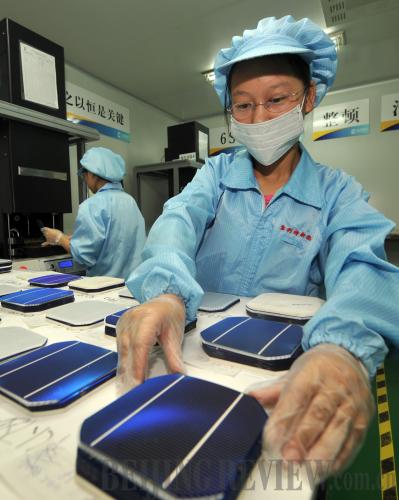|
 |
|
BOOMING PRIVATE SECTOR: Workers in a new energy company in Wenling, Zhejiang Province are examining monocrystalline silicon solar cells they produced. The private economy is booming in the coastal province of east China (WANG DINGCHANG) |
Chinese Premier Wen Jiabao set in motion the policies and measures to encourage and guide the sound development of private investment at an executive meeting of the State Council on March 24. While aimed at improving the overall private investment environment, these measures will help promote China's economic restructuring and maintain its growth momentum, said Sun Lijian, a professor of finance at Fudan University in Shanghai, in an article for Shanghai Securities News. Edited excerpts follow:
While lowering the threshold allowing private companies to invest in more industries, the Chinese Government should pay attention to the difficulties private companies face in securing venture capital financing and managing financial risks. The government must also focus on cutting the reliance China's manufacturing sector has on imported resources and energies, and increasing the country's strategic resource reserves.
First, one of the top priorities for the government is to strengthen incentives for private companies to explore technological innovations. Intensified competition will undoubtedly generate great demand for research and development talents and help private companies to sharpen their competitive edge. This in turn will help the nation scale new technological heights.
Second, the government is determined to expand the scope and sphere of private investment in order to break up monopolies enjoyed by a few state-owned enterprises (SOEs), which have been held responsible for the current imbalanced economic growth in China. Based on their accumulated experience over the years and sensitivity to risks and opportunities in the markets, private companies will play an important role in enhancing resource allocation efficiency during China's industrial restructuring.
Third, while encouraging private capital to seek sound, transparent development and private companies to maintain positive growth, the State Council prioritized the protection of their interests. Ownership ambiguity and insufficient intellectual property protection for private companies have prevented large amounts of private capital from entering the market, causing prospective investors to devote their resources to other projects to make fast cash. This could be detrimental to China's endeavor to establish competitive advantages for its products and services, or branding efforts for its industrial sector on the global economic stage.
Also, some private investors, eager to make quick money, may resort to illegal practices. SOEs, which enjoy monopolies over certain resources and have influence on decision makers, could be more audacious in their dealings. Therefore, one of the highlights of the incentive policy will be the government's efforts to involve private companies in the SOE restructuring process in multiple ways, including becoming controlling shareholders of SOEs, or purchasing certain assets from SOEs.
Fourth, to effectively address private companies' financing problems, China has to further develop investment and platforms for direct financing and attract various investors, which can easily be done by developing charity and private equity funds. Profit-oriented commercial banks cannot play the role of venture capitalist for private companies, which are usually small in size and vulnerable to external risks and unable to secure large mortgage loans. Currently, loans from domestic banks account for 13 percent. The government should in particular help private companies secure venture capital financing and improve their risk management capacities when starting up or expanding.
China's economic growth—that is currently propelled largely by domestic demand—could become more reliant on the government's economic incentives if we fail to improve the investment and financing environment or give private investment an important role in stimulating the Chinese economy. We must also dedicate more efforts to finding a model of sustainable economic growth.
In this scenario, problems such as companies' low efficiency of operation, slow employee income increases, restrictions on income reallocation, as well as companies' inability to produce globally competitive products will lead to inconsistencies between the fast and continued growth of Chinese enterprises and the slow income increases of individuals even if the Chinese market continues to prosper. The overall competitiveness of the Chinese economy will diminish if it loses its growth momentum. And if the current round of prosperity is based only on fiscal support or fast-ballooning asset prices, a hard landing will be inevitable when these incentives are stopped or the asset bubbles burst.
Take the recent iron ore price hike as an example. China, as the world's largest buyer of iron ore, is not in a position to negotiate with the three largest iron ore suppliers, BHP Billiton Ltd., Rio Tinto Group and Vale SA (See page 30). Among the reasons, the one that stands out is that the three suppliers are increasing prices in order to squeeze Chinese domestic traders. Additionally, excessive investments in certain industries or regions also accounts for the nation's high demand for imported resources.
The endeavor to improve the environment and expand channels for private investment is also conducive to encouraging qualified companies to withdraw from energy-consuming industries and cutting China's demand for imported resources. The government should also increase strategic reserves of various resources and curb speculative maneuvers on resource prices in order to help private companies survive. The Chinese Government could also designate a panel consisting of both private companies and SOEs to negotiate with the three iron ore suppliers. Whatever the plan, the government should prevent licensed SOE importers of these raw materials from reselling them to private companies at a price much higher than contract prices agreed on between importers and suppliers.
| 